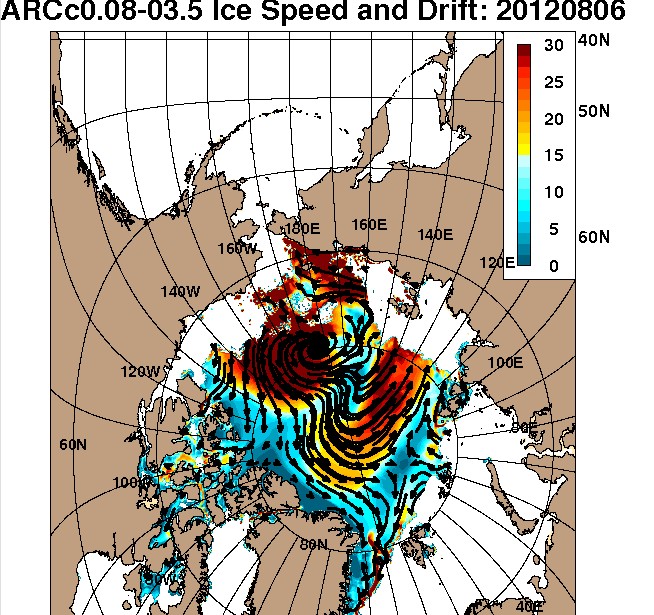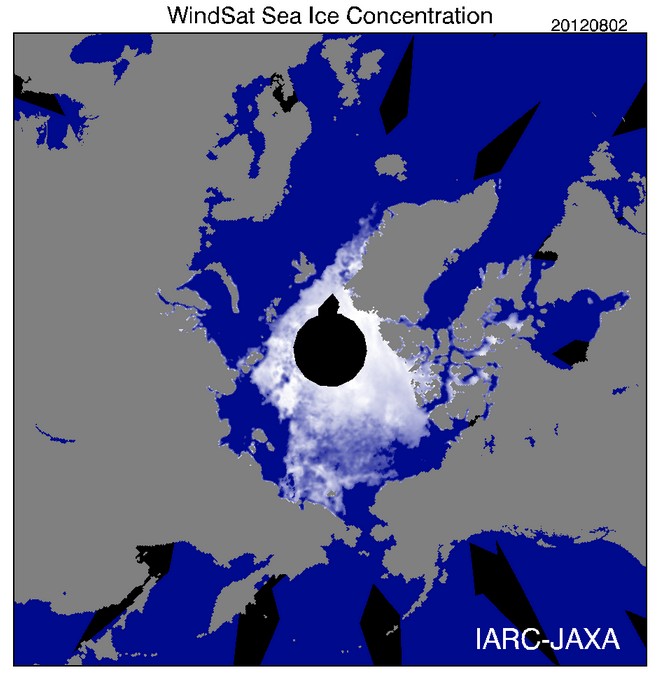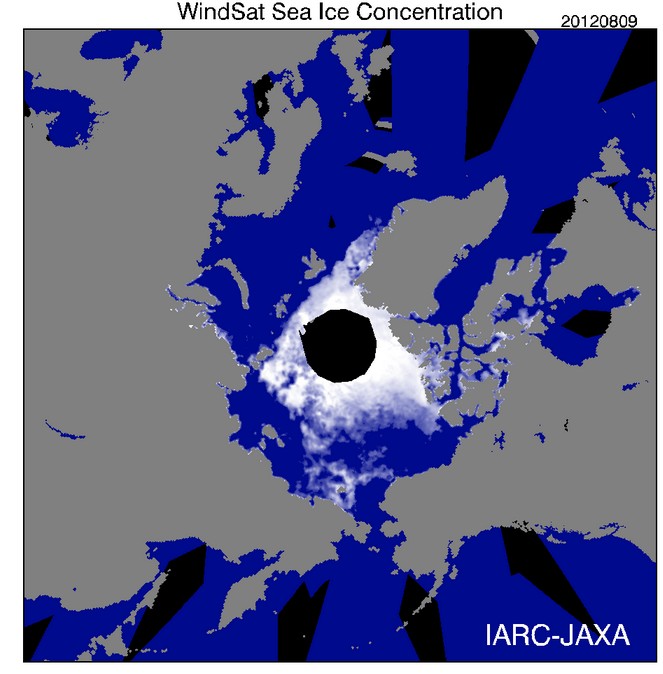Mark Serreze fooled a lot of people in 2007, and then tried to back of it.
“In hindsight, probably too much was read into 2007, and I would take some blame for that,” Serreze said. “There were so many of us that were astounded by what happened, and maybe we read too much into it.”
Tricky Sea Ice Predictions Call for Scientists to Open Their Data | Wired Science | Wired.com
He is back doing the exact same thing in 2012.
“I don’t think the big storm that we have earlier this month had much of an effect,” said Mark Serreze, the NSIDC director. “The rapid loss of ice we’ve seen over the past few weeks has been in the East Siberian Sea (north of Eastern Siberia) and this ice was already posed to melt out, with or without a storm.”
Arctic Sea Ice Record Now Could Be Set in August | Climate Central
The ice loss was mainly in the Chukchi Sea, where the storm was. The storm brought warm water to the surface. How could a scientist suggest that the storm did not affect the minimum?





As Dr. Stroeve pointed out, but you just can’t seem to get, these kinds of cyclones can only damage the ice if the ice is already thin and fractured.
Speaking of thin and fractured…this reminds me of your entire position that nothing unusual has happened in the Arctic this summer.
RGates,
still looking for the data that says what’s happening in Arctic ice right now has never happened before. Where is that proof? Put up or shut up.
You are an alarmist. If you don’t own a helmet to protect yourself from the falling sky then put both of your hands on top of your head and interlock the fingers to help provide some degree of protection from your untold horrors of the sky falling on your head.
As Julienne explained, the storm had a major impact on the ice extent. Are you completely daft?
Do just a LITTLE background reading, okay?
“While the total area of ice cover in recent winters [prior to 2007/2008 winter] has remained about the same, during the past two years an increased amount of older, thicker perennial sea ice was swept by winds out of the Arctic Ocean into the Greenland Sea. What grew in its place in the winters between 2005 and 2007 was a thin veneer of first-year sea ice, which simply has less mass to survive the summer melt.” […] “Unusual atmospheric conditions set up wind patterns that compressed the sea ice, loaded it into the Transpolar Drift Stream and then sped its flow out of the Arctic,” Ignatius Rigor, “Rapid reduction of Arctic perennial sea ice,” Geophysical Research Letters, VOL. 34, L19504, 6 PP., 2007 doi:10.1029/2007GL031138.
As far as your idea that a cyclone could sweep across Arctic ice and “only damage the ice if the ice is already thin and fractured” is concerned: Consider that Arctic sea ice is floating on…the sea. A cyclone moving across floating ice is changing the air pressure as it moves across the surface. Changes in air pressure cause changes in sea level that more as the storm moves. Changes in sea level exacerbate stresses already existing in sea ice and lead to increased fracturing. Did you think that thick Arctic sea ice was some sort of homogenous, smooth shield across which a storm would slide with relatively little effect? Arctic sea ice is never homogenous. It is always in flux for many different reasons.
I’ve written dozens of posts on that topic. You haven’t done any background research.
How could he believe it? The ignorance of the experts.
I never thought I’d find a denier site more insane than WUWT; this one is. Anyone looking for intelligent commentary, go elsewhere. Even WUWT has more intellectual rigor!
Do you have anything intelligent to say, moron?
Oh loupy squared is here!
Since you could not provide a credible counter to Steve’s post you fall back on the shallow pond insults instead.Maybe it is too hard for you to dredge up the effort because you are too busy being a moron.
LOL
What’s to deny (can you manage it in a paragraph, my time is precious to me)?
I am just a lowly engineer down here in NZ.I visit this site every day several times.Can one of you experts please explain to me why a little extra ice melting occasionally will have any negative effects on the earth?After all,in my mind,we are still recovering from the ice age.I would like to see evidence that proves a warmer planet would not be beneficial for man kind.Just my thoughts.
It will change weather pattern and accelerate Arctic waming..
And? Gonzo
What data set shows dangerous Arctic warming?
Of course you can SHOW us the Arctic warming acceleration evidence….
Snicker….
The 2007 IPCC report had a long list of benefits of a warmer climate which they thought may become balanced by disadvantages around 2C. The politicians and media haven’t either read or shared that part but it’s all there and quite obvious that more food and fewer deaths from cold, coupled with less energy usage were all guaranteed from a warming of 2C and quite possibly even more. Not that it ever happened mind you.
Loupy lou seems to have really twisted knickers.Maybe she/he has hot pants from global warming.LOL.
http://tugpullpushstop.blogspot.com/2012/08/and-of-course-i-was-right-again.html
That is off topic and ignorant.
Read Julienne Stroeve’s explanation
http://stevengoddard.wordpress.com/2012/08/19/julienne-stroeve-explains-the-effects-of-the-winter-storm-which-hit-the-arctic-two-weeks-ago/